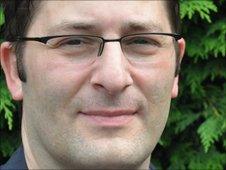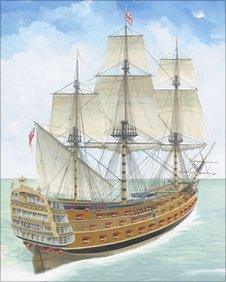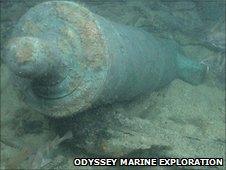Call for full excavation of HMS Victory shipwreck
- Published

Dr Kingsley said the ship's fate was Britain's greatest maritime mystery
An archaeologist has called for the wreck of the HMS Victory to be brought to the surface to avoid further damage.
Dr Sean Kingsley is an archaeological consultant for Odyssey Marine Exploration, who found the shipwreck in the English Channel in April 2008.
He said the site would continue to suffer damage from bottom fishing and could not be protected by exclusion zones as it is too far from land.
The site's future is the subject of a public consultation ending on 30 June.
The consultation, being held by the UK government's Department of Culture, Media and Sport and the Ministry of Defence, puts forward three options; manage the site with no excavation, limited excavation and management of the site and full excavation with the artefacts being used to educate and celebrate Britain's heritage.
Dr Kingsley said: "Sometimes you can leave ships in shallow waters, you can protect them, you can create exclusion zones, people can dive on them and the money from that can contribute to local economies. When you're out of the sight of land, 100m down it's just not an option.
"It seems to us the most responsible and sustainable option it is take that ship out of harm's way, put it on shore for education and promoting heritage so that everyone can enjoy it."
More than 1,000 sailors drowned when the British flagship, the predecessor to Lord Nelson's Victory, sank in a storm in 1744.
The finding of the site by the US-based exploration company in April 2008 was nearly 100 km (62 miles) from where the ship was historically believed to have been wrecked, off the infamous Casquets near Alderney in the Channel Islands.
In September, after artefacts, including two cannons, were brought up from the seabed the wreck was confirmed as that of Admiral Sir John Balchin's HMS Victory.

Balchin was blamed for the loss as it was thought the ship hit the Casquets
Dr Kingsley said discussions of the future of the site depended on three factors; how important the site was, to what degree it was at risk and what benefit it could be to society.
He said: "In many ways it is the early Georgian Titanic, you have to bear in mind that in 1744 it was the biggest ship in the world. When it was destroyed there was this collective paranoia.
"There aren't many first-rate Royal Navy flagships that were lost, in fact this is the only one and when we lose this it's game over there's nothing left."
As to the risk to "Britain's greatest maritime mystery" Dr Kingsley said attitudes had changed amongst some underwater archaeologists about the safety of wrecks.
He said: "There's a tendency to think the deeper you dive the more pristine and frozen in time these wrecks are and maybe five years I thought the same.
"What we're finding, especially in the Channel which is one of the most heavily trafficked sea lanes in the world, is that people have been there before us and we're finding unfortunately these tell tale signs of bottom fishing. A lot of fishermen don't know that these wrecks are down there they just think it is an undulating seabed.
"We're finding on HMS Victory, and actually 43% of the sites [in the English Channel], that they have been heavily impacted from the offshore fishing industry so it's a bit of race against time."

Two cannons brought up from the wreck confirmed its identity
Dr Kingsley, who is the director of Wreck Watch International, was visiting Guernsey and Alderney to speak about the hopes of Odyssey for the future of the site.
The company has previously proposed funding and undertaking the full excavation of the site including conservation, developing educational materials.
He said the islands had a very special relationship with the shipwreck.
"The story of Balchin's victory is ingrained in the very sand here, it was the islanders here that actually started to find bits of wreckage off Guernsey, off Alderney."
Dr Kingsley said that everybody was quite shocked when the wreck was found 100km away from its supposed location.
He said: "It's been quite a sensitive issue in many ways to look at and we've tried to be as responsible as we can, look at the data, not be sensationalist and say guys we're going to have to reconstruct what we thought about the past."